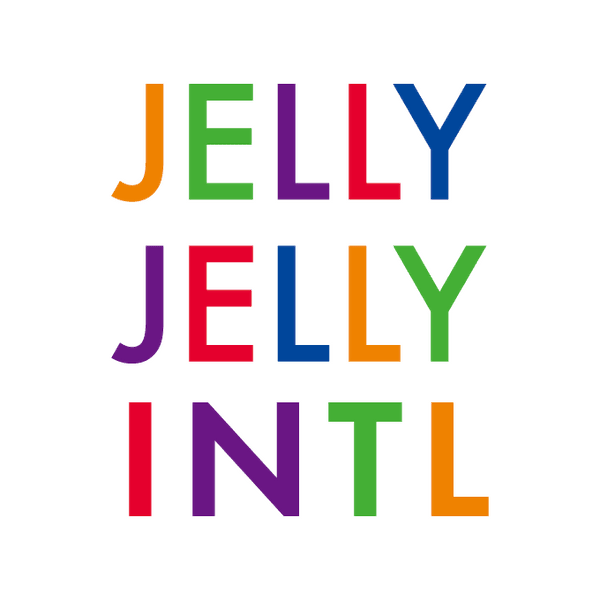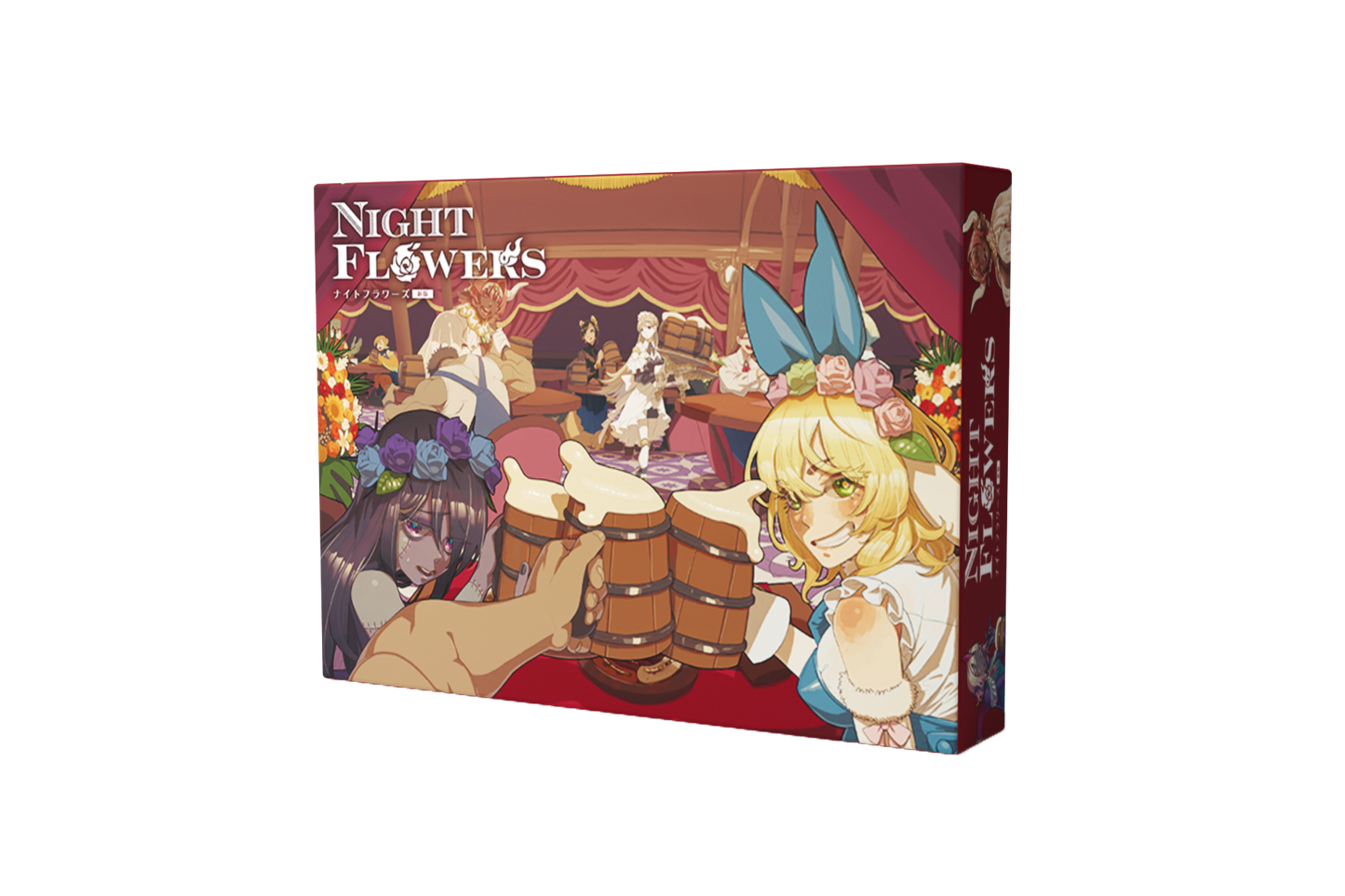
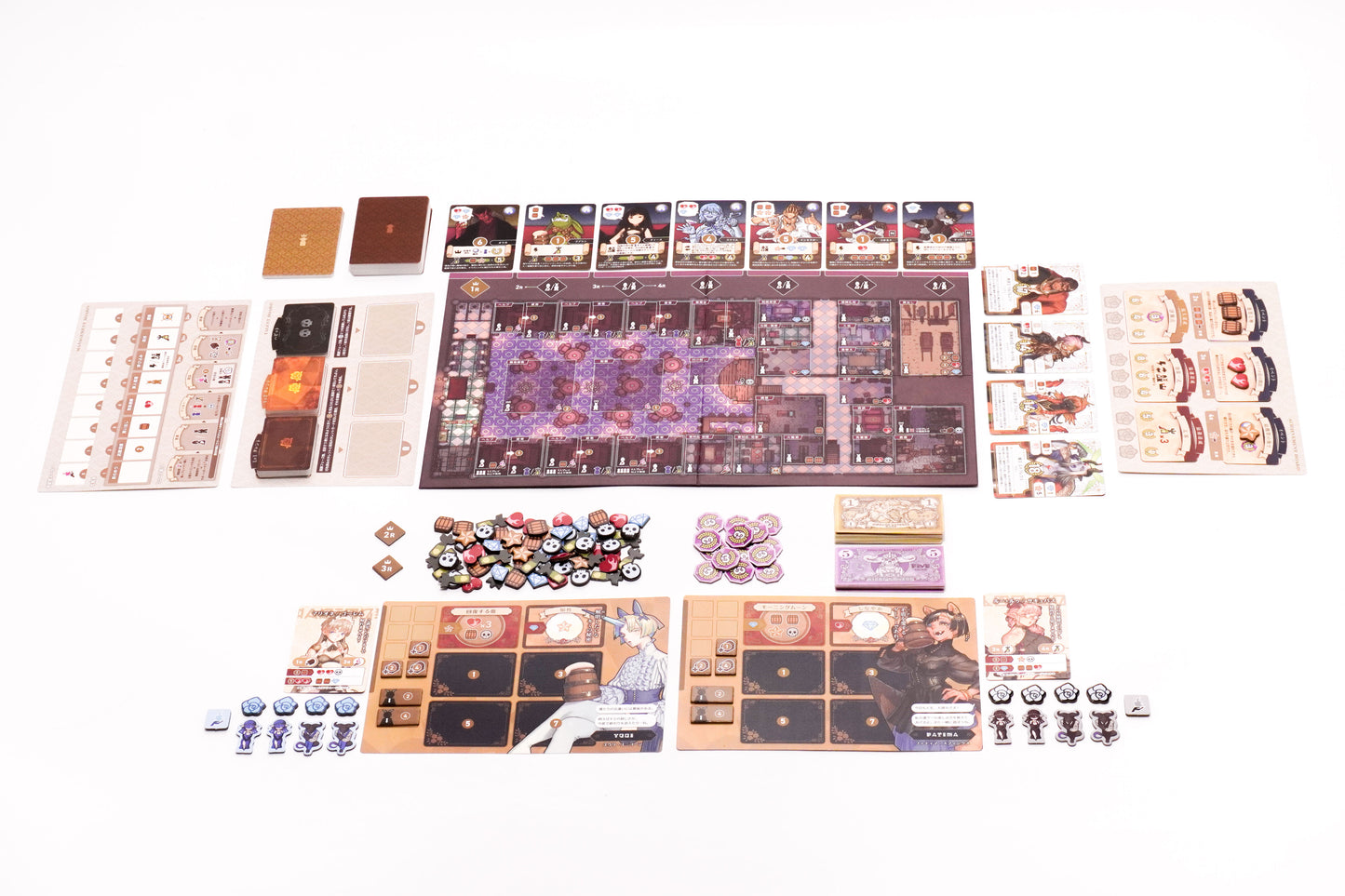
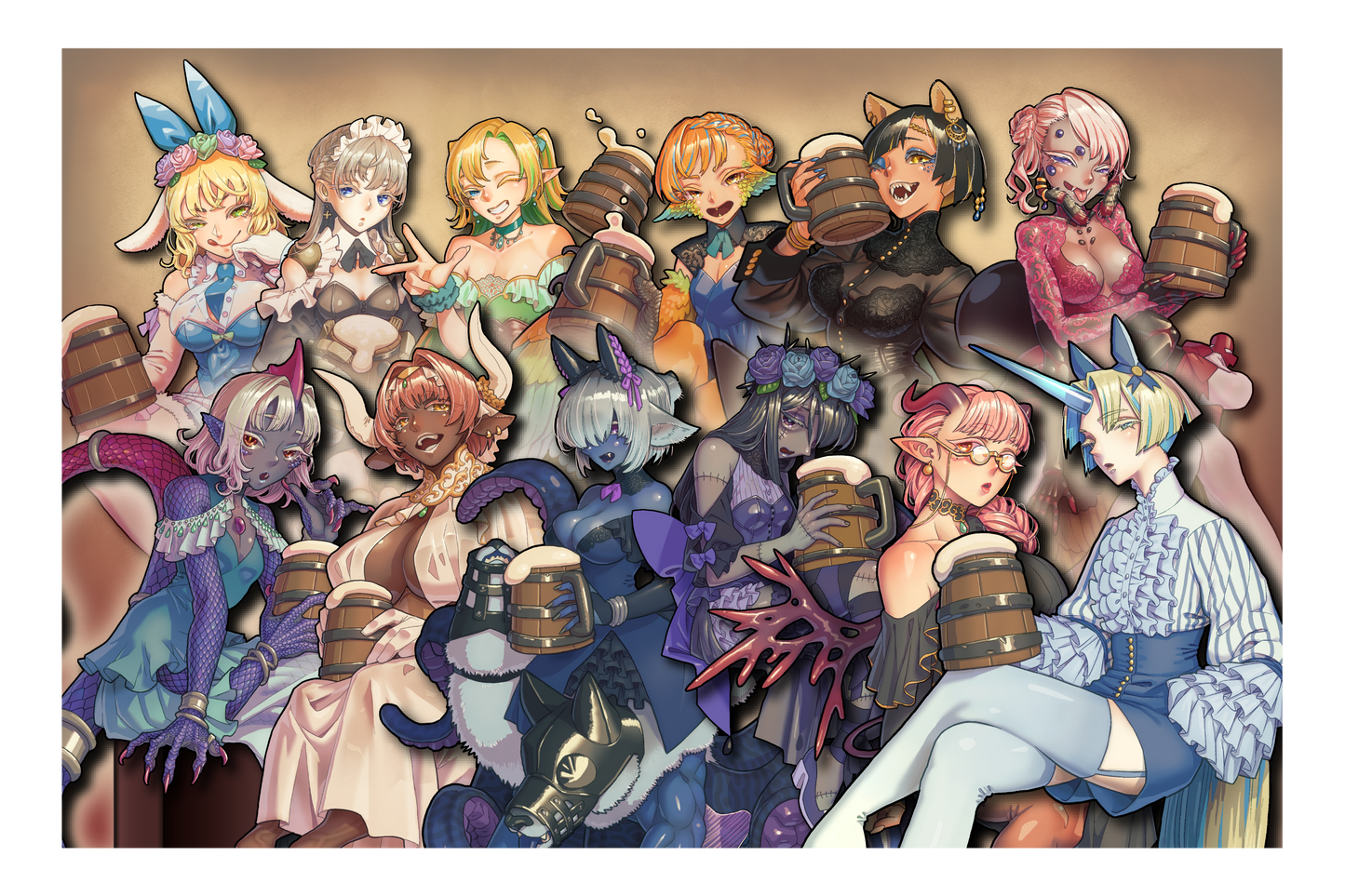
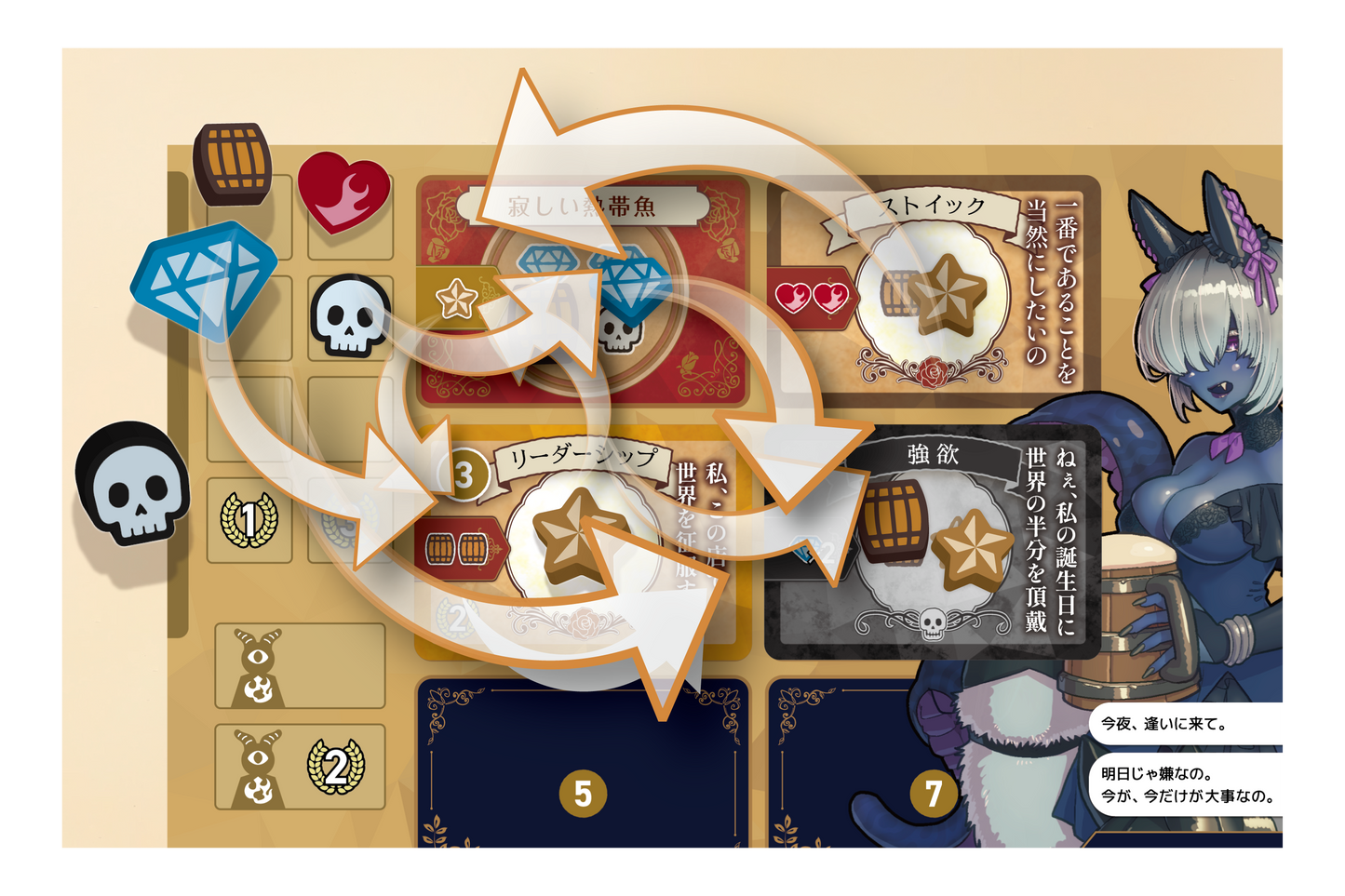
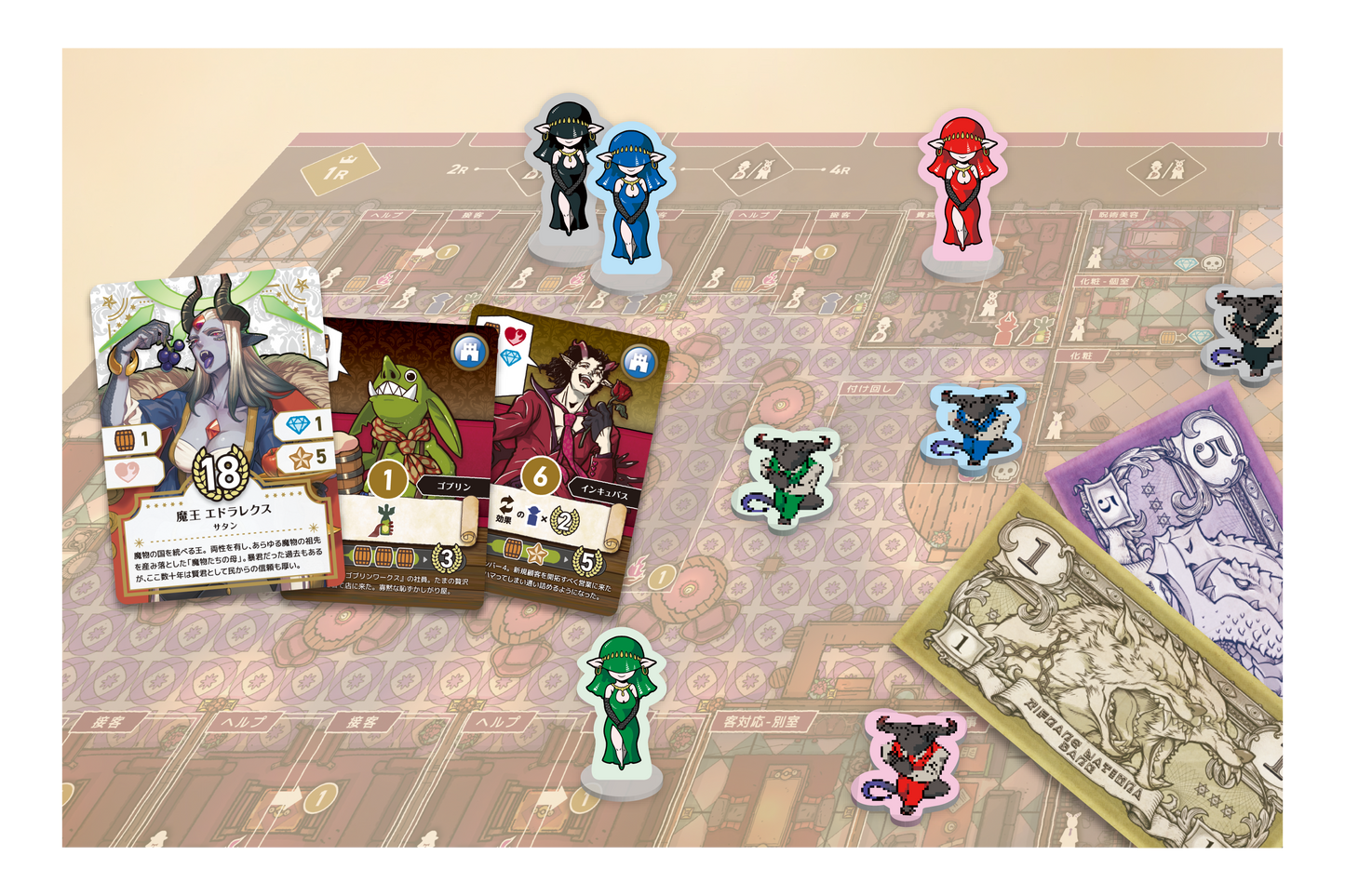
This game is a complete Japanese version. English-language rulebook files can be downloaded for free below, and English translations of certain language-dependent guest cards are provided as a PDF with your purchase!
About the Game
Night Flowers Game Overview
Gather charm tokens while avoiding the accumulation of stress to meet the needs of your guests - if you meet their requirements, some might even become big spenders! This tavern manager is played over four action-packed rounds with six phases each. Below is overview of the game. More detailed rules can be found in the rulebook.
Each round of the game is carried out over six phases:
1. Clock-In Phase
2. Business Phase
3. After Shift Phase
4. Closing Phase
5. Evaluation Phase
6. End of Work Phase
Clock-In Phase:
During this phase, players will take turns placing their player tokens on a variety of spaces to claim their turn order and clock-in bonuses. The fastest space "Eager Start" allows you to move first during the Business Phase at the cost of having no additional effects. The next space, "Store Cleaning" has you move second, but provides some money as compensation. The eighth and slowest of the spaces allows you to discard a detrimental stress token from your storage, freeing up space for more useful items!
Business Phase:
This phase takes up the bulk of the game - players do their main actions in the order they determined during the Clock-In Phase, but can also perform a variety of free actions at any time, like utilizing their talents to convert certain charms into others or activating the effects of guests in their section. Guests all require specific combinations of charms to bring them into your section, so using these free actions to generate and convert charms is key.
A player's main action involves moving one of their character or staff pieces on the board to activate the effects of the given space. Effects depend on where in the tavern the space is - some spaces generate certain charms, others money, while others create new storage space (for holding more charms) or reduce stress. Some spaces even allow the player to move one of their staff or character pieces again - there are many effects, and figuring out the best way to move your pieces around for your main actions is important for victory.
Players continue performing main actions in Clock-In order until no one has any character or staff pieces left that can be moved.
After Shift and Closing Phases:
The After Shift Phase gives players with the resources to do so the ability to bring additional guests/patrons into their section or convert a guest into a big spender in exchange for gaining a stress token. This can be very beneficial if one wasn't able to perform one of these actions during the Business Phase, but accumulating too much stress can fill up your charm storage and prevent future progress. Careful use of these extra actions is required.
During the Closing Phase, players earn contribution bonuses (money based on the number of times they performed a relevant action during the Business Phase) and collect all of their character and staff pieces from the board.
Evaluation Phase:
During the Evaluation Phase, players can acquire talents and other upgrades by paying the appropriate costs.
First, players draw cards from the Lv. 1 and Lv. 2 Talent Decks, and, by paying the necessary amount of money, can attach a talent to their main character to improve their performance in future rounds. These abilities, mentioned during the free action section of the Business Phase, are often used for converting certain charm types into others. Lv. 2 Talents are stronger, and therefore cost more money to attach.
"Quirks" (a habit picked up by characters as a way to relieve stress) can also be acquired by discarding two stress tokens from your storage. Quirks often convert more valuable charms into less valuable ones, but depending on your strategy, it may be useful to acquire one for producing a large amount of a particular charm or simply to get rid of accumulating stress.
Players can also pay to open up additional storage slots (the second and third opened slots grant victory points!) or to awaken (promote) their staff pieces (the second promoted staff piece grants victory points!). Awakened staff pieces can access even more spaces within the tavern!
At the very end of the Evaluation Phase, players can utilize excess money to directly purchase evaluation point tokens, which turn into victory points at the end of the game. The cost per evaluation point token goes up each round, so taking advantage of this early could be useful! On the other hand, saving your money for use in the next rounds could also be beneficial if you think you may be able to open up more storage or awaken staff pieces soon!
End of Work Phase:
This phase is comprised of preparation for the next round. Events will progress, and guests will also be cycled through the waiting area. Depending on the round, there may be more or fewer VIP guests, so players will need to pay close attention to the new lineup of guests!
Because this phase is just preparation for the next round, it does not happen during the fourth and final round of the game.
Victory Points and Deciding the Winner:
The winner is decided by comparing the total number of victory points each player gained from a variety of sources, including: completed quests, guests converted into big spenders, effects from VIP guests, patrons, evaluation points, talents, unlocked storage, and promoted staff. The player with the most stress tokens in their storage loses victory points equal to the number of stress tokens they have! After calculation, the player with the most victory points is the winner!
There are many things to manage in this game, but lovers of both monster girls and engine building games alike will be sure to enjoy it! As we say in Japan, お疲れ様です (otsukaresama desu・Thanks for your hard work)!
Game Related Media
The following is a brief introduction to the game. The video is in Japanese, so please enable English subtitles.
Files and Rulebook Download
You can access the English materials for the game here.
